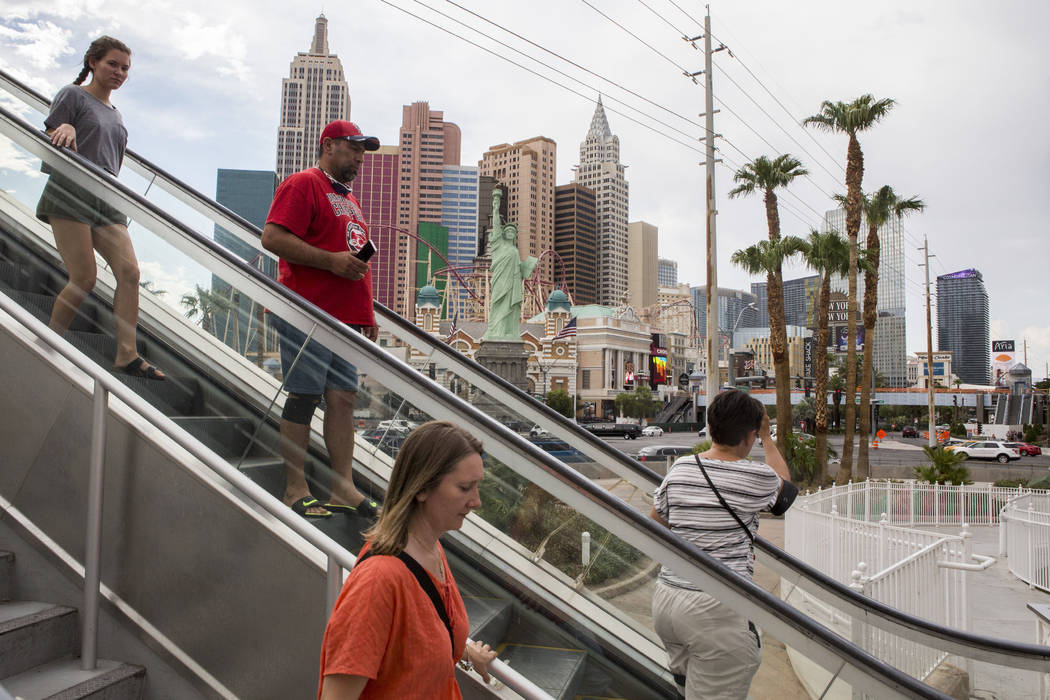No long-term effects on tourism expected after Las Vegas shooting
A return to normalcy for Las Vegas tourism may still be weeks away, but there should be no long-term effects on tourism to Southern Nevada because of the Oct. 1 shootings.
“Thankfully, the feedback that we got was that cancellations were in the very near term and largely focused on individual leisure travelers,” said Kevin Bagger, executive director of the Las Vegas Convention and Visitors Authority Research Center. “We didn’t get any feedback that there were material cancellations of the conventions and meetings side. A lot of that emerged from relationships we’ve had over decades of just working together.”
Bagger worked with seven people within his department and several others in the LVCVA’s public affairs, sales and marketing departments to compile the data.
He said he and his staff contacted all the major resort groups in Southern Nevada to get their assessments on how much damage was done. In some cases, they talked with representatives of resort groups such as MGM Resorts International, which operates 10 Strip properties, and Caesars Entertainment, which has nine Las Vegas resorts. They also reached out to several individual properties.
Information received on specific resorts and their future bookings is considered proprietary and was not disclosed.
But for the most part, a pattern of light cancellations immediately after the Route 91 Harvest Festival concert shootings with no long-term issues emerged.
So when do things get back to normal?
‘Normal is relative’
“Normal is relative,” Bagger said. “The general view is that it appears to be — knock on wood — a short-term or near-term impact. That being said, we are acutely aware of the fact that there are people suffering, people who are recovering from what happened and we want to acknowledge that while also acknowledging that we have a workforce here to serve and that we rely on tourists to come here and contribute to the economy.”
The LVCVA began minutes after the shooting stopped to modify its advertising and marketing message, gradually changing it over time as community leaders assessed the potential economic damage to the community.
“Finding that middle ground — and eventually, we will — we’ll go with the broader leisure message,” Bagger said. “‘What happens here, stays here’ is temporarily on hold. But we’ll find that time that it is appropriate to go out with that message. It’s still an ongoing process.”
Social media monitoring
Social media also provided a means for discovering public perception.
Some of it is gleaned through software programs. Other comments were discovered by observation.
“In the age of social media, part of that ‘research’ is just monitoring sentiment online, what people are saying about the destination,” Bagger explained.
“Some of that requires actual people going through threads of posts and in this case, the posts, as you would expect, were overwhelmingly positive and supportive and comforting.”
The team also monitored communications from out of town to gauge how visitors were thinking about safety and security.
“We did out-of-market research to understand if there are any perceptual concerns about Las Vegas, awareness and intent to travel to Las Vegas. In this case, safety was certainly something we had to assess. Luckily, the feedback was that Las Vegas was and is being perceived as a safe destination as compared with other major U.S. cities,” Bagger said.
Jacqueline Peterson, who heads the LVCVA’s communications and public affairs departments, said pinpointing a date when operations can be considered “back to normal” is inexact, but she paraphrased LVCVA President and CEO Rossi Ralenkotter when he was asked the question.
“‘When it’s time, when they’re ready, we will know,’” Peterson said. “I don’t think anybody can put a timeline to any of this because there’s so much to process and go through.”
Contact Richard N. Velotta at rvelotta@reviewjournal.com or 702-477-3893. Follow @RickVelotta on Twitter.






















